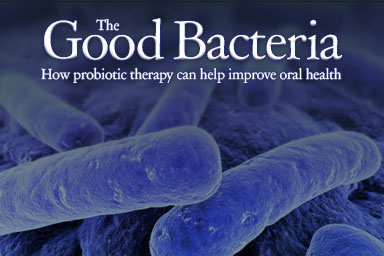
The use of probiotics to maintain and improve overall health has grown in recent years. Typically recommended to treat digestive problems encountered during antibiotic therapy, emerging evidence shows that probiotics may provide benefits to oral health as well. Positive reports about how probiotics can help combat dental caries, periodontal diseases and oral malodor have boosted interest in their use. By educating patients about the benefits and proper use, dental hygienists can help patients understand how probiotic therapy can improve oral health.
Good Bugs Do Good Things
Probiotics are bacteria that—when present in sufficient numbers—can help the body maintain a healthy balance of microflora. The most common use of probiotics is to restore the body’s beneficial bacteria after antibiotic use. Probiotics are available in dietary supplements, yogurts, suppositories and creams. In the oral health care arena, probiotic-infused chewing gum and lozenges are also available.
Probiotics can be used to prevent disease from occurring and as a first line of defense. Some patients, however, may not understand how probiotics can improve their oral health. For those who may benefit from this therapy but are slow to embrace change, dental hygienists can provide education and motivation to help them better understand the benefits of probiotics.
Building on Prior Knowledge
“The best way to discuss probiotics with patients is to begin with what they already know”, suggests Sarah DeBowes, RDH, BS, MS, adjunct clinical instructor at the Hirschfeld School of Dental Hygiene, Old Dominion University in Norfolk, Va. “Ask them if they’ve ever heard of probiotics, and if so, what they know. This gives dental hygienists the opportunity to evaluate the patient’s current knowledge so that education can be tailored accordingly,” she says.
If a patient is unfamiliar with probiotics, DeBowes explains, the dental hygienist can help the patient understand the basic concept of how they work by explaining that antibiotics kill “bad” bacteria, while probiotics deliver “good” bacteria that can improve oral and systemic health.
Marilynn Rothen, RDH, MS, clinic manager at the Regional Clinical Dental Research Center at the University of Washington in Seattle, emphasizes how knowledge about probiotics can vary among patients. For example, those who are health-conscious may already understand that the live cultures of good bacteria found in some dairy products can benefit the digestive system. Others may understand that certain bacteria in the oral cavity can cause gingivitis and dental caries. “What they may not know,” Rothen points out, “is that scientists estimate there are more than 800 types of bacteria in the mouth, and most are ‘healthy bacteria’ that do not cause disease.”
Are You a Good Candidate for Probiotics?
A number of over-the-counter probiotic products are available. According to DeBowes, these types of probiotics are best suited for those who struggle with oral malodor, gingivitis, periodontal diseases or dental caries. “Probiotic research shows great promise in reducing the severity of these conditions by incorporating good bacteria into the oral cavity, and helping to restore the balance of a healthy mouth,” she says.
For patients who want to reduce the incidence of dental caries, probiotics may offer a valuable adjunctive treatment. One study found that adults who used probiotics experienced significantly reduced plaque accumulation compared to individuals in the control group.
Another study focused on how probiotics fight cavities, or caries. Study participants consumed probiotic-infused milk on a daily basis for seven months. At the end of the study, the children who consumed the probiotic-infused milk demonstrated a significant reduction in caries compared to the control group that drank plain milk over the study duration.
Patients affected by periodontal diseases may also benefit from probiotics. Separate studies have shown that the probiotics Lactobacillus casei and Lactobacillus brevis both exhibit beneficial anti-inflammatory effects among subjects with periodontal diseases.
Finally, probiotics may aid patients with oral malodor. Two studies have shown that probiotics infused into a mouthrinse, lozenge, chewing gum or tablet can significantly decrease oral malodor within four weeks.7,8
“Though most of these trials included a small number of participants and were conducted over a brief timeframe, it appears that probiotics may exert their effect both in the oral cavity and systemically,” Rothen says. “For example, locally they may compete with pathogenic bacteria for adhesion sites in the oral cavity, while at the same time stimulating the host’s immune response or reducing the inflammatory response.”
Optimizing Your Probiotics Usage
Optimizing the beneficial effects of probiotics requires accurate education provided by the dental team. Clinicians need to explain specifically how probiotics may improve a patient’s oral health, which should be followed by instructions on how to properly use the product.
“For example,” DeBowes says, “GUM® PerioBalance® lozenges should be used once daily for at least 28 consecutive days. To get the greatest result from these lozenges, they should dissolve in the mouth over a 10-minute period immediately following the patients’ oral hygiene regimen. Nothing else should be utilized in the mouth for at least 30 minutes afterward.”
Probiotic’s side effects are typically mild and include gas and bloating.6Probiotic products are not for everyone, however. DeBowes and Rothen agree that immunocompromised patients should avoid probiotic supplements because of potential negative side effects in this patient population.
It’s Only Getting BETTER!
Probiotics show promise in their ability to reduce the severity of dental caries, periodontal diseases and oral malodor by incorporating good bacteria into the oral cavity and helping to restore the balance of a healthy mouth. As more research is conducted on probiotics, it is likely to solidify their therapeutic applications, and perhaps reveal new ones. This is good news for dental hygienists and their patients, who will potentially enjoy an expanding set of easy-to-use tools for preventive care.